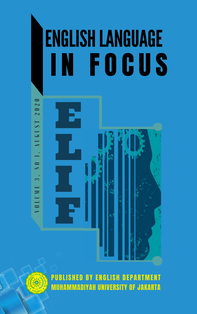Improving Students Listening Comprehension with Mobile App “English Listening Test”
DOI:
https://doi.org/10.24853/elif.3.1.69-78Keywords:
mobile listening app, listening comprehensionAbstract
The use of Android smartphones will improve the skills of English Language Learners to the segments of the level they want to achieve. Language students are able to select the various android apps as necessary, such as speaking, listening, reading, writing, components of languages, vocabulary mastery, and even sentence structure in English. This can be used as an English aid by all levels of learning or can be used as a media resource. The purpose of the study was to find out the use of the Mobile-based English Listening Test App enhances students' listening comprehension. The methodology towards this research was quantitative. This research used a pre-experimental sampling frame using pre-test and post-test. In collecting the data, the researchers used the listening test as an instrument. The subjects of the research were SMK Gelora Bekasi's 10th grade students. The result reveals that the total student post-test score in the experimental class was higher (15,871) than in the control class (2,028). Based on the t-test, above 15,871 average result was obtained at the level of freedom (df) of 36 (36-1 = 35), while 2,028 of of average result was obtained at the level of significance of 5 percent. Since t0 is higher than the tt score obtained from the results of the calculation, a positive hypothesis (H1) can be acknowledged. The hypothesis finding implies that the use of the Mobile English Listening Test App enhances students' comprehensive listening skills.References
Asemota, H. E. (2015). Nature, Importence and Practice in Listening Skill. British Journal of Education, 3(7).
Bacon, S. M. (1992). The Relationship between Gender, Comprehension, Processing Strategies, and Cognitive and Affective Response in Foreign Language Listening. The Modern Language Journal, 76(2), 178. https://doi.org/10.2307/329769
Churinov, A. (2016). DropVox Application – Download and Voice-Record with Ease. Dialog on Language Instruction, 26(1), 99–101. http://www.dliflc.edu/resources/publications/dialog-on-language-instruction/
Creswell, J. W. (2014). Research Design: Qualitative, Quantitative, and Mixed Methods Approaches. Sage Publication Inc.
Demouy, V., & Kukulska-Hulme, A. (2010). On the spot: Using Mobile Devices for Listening and Speaking Practice on a French Language Programme. Open Learning, 25(3), 217–232. https://doi.org/10.1080/02680513.2010.511955
Flowerdew, J., & Miller, L. (2001). Second Language Listening : Theory and Practice. In Second Language Listening. Cambridge University Press. https://doi.org/10.1017/cbo9780511667244
Gangaiamaran, R., & Pasupathi, M. (2017). Review on Use of Mobile Apps for Language Learning. International Journal of Applied Engineering Research, 12(21), 11242–11251. http://www.ripublication.com/
Gay, L., Mills, G. E., & Airasian, P. (2019). Educational Research : Competencies for Analysis and Applications (12th ed.). Pearson Education, Inc.
Gilakjani, A. P., & Ahmadi, M. R. (2011). A Study of Factors Affecting EFL Learners’ English Listening Comprehension and the Strategies for Improvement. Journal of Language Teaching and Research, 2(5). https://doi.org/10.4304/jltr.2.5.977-988
Hwang, W. Y., Shih, T. K., Ma, Z. H., Shadiev, R., & Chen, S. Y. (2016). Evaluating Listening And Speaking Skills in a Mobile Game-Based Learning Environment With Situational Contexts. Computer Assisted Language Learning, 29(4), 639–657. https://doi.org/10.1080/09588221.2015.1016438
Pellerin, M. (2015). Using Mobile Technologies with Young Language Learners to Support and Promote Oral Language Production. International Journal of Computer-Assisted Language Learning and Teaching, 4(4), 14–28. https://doi.org/10.4018/ijcallt.2014100102
Sung, Y. T., Chang, K. E., & Yang, J. M. (2015). How Effective are Mobile Devices for Language Learning? A Meta-Analysis. In Educational Research Review (Vol. 16, pp. 68–84). Elsevier Ltd. https://doi.org/10.1016/j.edurev.2015.09.001
Downloads
Published
Issue
Section
License
Authors who publish with this journal agree to the following terms:
- Authors retain copyright and grant the journal right of first publication with the work simultaneously licensed under a Creative Commons Attribution License that allows others to share the work with an acknowledgment of the work's authorship and initial publication in this journal.
- Authors can enter into separate, additional contractual arrangements for the non-exclusive distribution of the journal's published version of the work (e.g., post it to an institutional repository or publish it in a book), with an acknowledgment of its initial publication in this journal.
- Authors are permitted and encouraged to post their work online (e.g., in institutional repositories or on their website) before and during the submission process, as it can lead to productive exchanges, as well as earlier and greater citation of published work (See The Effect of Open Access).


